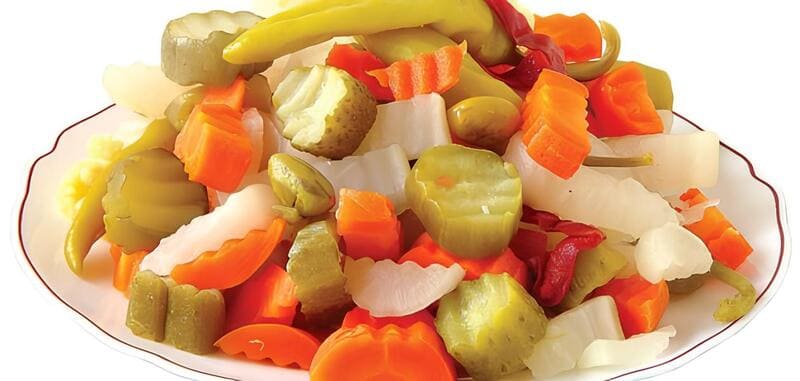
Egyptian mixed pickles, known locally as mukhalal or torshi, are a common delicacy enjoyed throughout the country. Infused with a vibrant blend of vegetables like carrots, turnips, and cauliflower, these pickles are typically prepared during Ramadan and other festive occasions. Their distinct savory, tangy, and slightly spicy flavor makes them a perfect accompaniment to various Egyptian dishes.
What sets Egyptian mixed pickles apart is their meticulous preparation and thoughtful use of ingredients like nigella sativa and hot red pepper sauce. Homemade pickles are often preferred over store-bought varieties, ensuring the purity and desired taste that speaks to Egypt’s rich culinary traditions. This recipe exemplifies that preference for homemade goodness.
Ingredients
- 2 carrots
- 1 lemon
- Small onions (urama)
- 1 medium cauliflower
- Small turnips
- 1 cucumber
- 1 red bell pepper
- 1 tablespoon nigella sativa
- Celery
- Salt
- Vinegar
- Sugar
- Water
- Hot red pepper sauce
Preparation
- Wash the lemon, place it in a pot with water, and bring it to a boil.
- Meanwhile, chop the cauliflower into small, manageable pieces.
- Peel and slice the carrots.
- Boil the urama onions in another pot until they are tender but not mushy.
- Peel the turnips and cut them into small cubes or finger-sized pieces.
- Peel the cucumber and slice it into rounds.
- Chop the red bell pepper and grate half to extract the juice.
- In a bowl, mix the grated carrot, red bell pepper, nigella sativa, celery, salt, and hot red pepper sauce. This will serve as the flavor base for the pickles.
- Combine the prepared vegetables (cauliflower, carrots, onions, turnips, cucumbers, lemon, and bell pepper) in a large mixing bowl.
- Layer the vegetable mixture into sterilized jars.
- In a saucepan, mix 3 liters of water with 12-13 teaspoons of salt and 1 tablespoon of sugar. Bring to a boil and let it cool.
- Pour the cooled brine solution into the jars, covering the vegetables completely.
- Add a splash of vinegar to each jar.
- Seal the jars tightly, ensuring the vegetables are submerged in the brine.
- Add a layer of oil on top to prevent air from entering.
- Store in a cool, dark place for at least 15 days before serving.
Did you know?
Mukhalal, or Egyptian mixed pickles, are more than just a side dish; they are a reflection of Egypt’s agricultural bounty and culinary heritage. The word “mukhalal” itself means pickled or marinated, indicating a method used historically to preserve various vegetables. Pickling has been an integral part of Egyptian cuisine for centuries, helping families preserve their harvests. Pickles (mukhalal) can vary greatly in flavor and composition depending on the region and household preference.
Common additions might include beets for color, garlic for extra zest, or even green beans. Another interesting fact is the inclusion of nigella sativa, known locally as “habbat al-barakah,” which not only enhances the flavor but also adds nutritional value with its antioxidant properties. Homemade pickles are a staple during festive seasons like Ramadan.
They are believed to aid digestion, making them a suitable accompaniment for the rich and hearty iftar meals. By ensuring the optimal blend of salt, vinegar, and spices, Egyptian families create pickles that are uniquely their own, a cherished tradition passed down through generations. So, the next time you relish the tangy crunch of Egyptian pickles, know that you are savoring a piece of Egypt’s culinary history.
